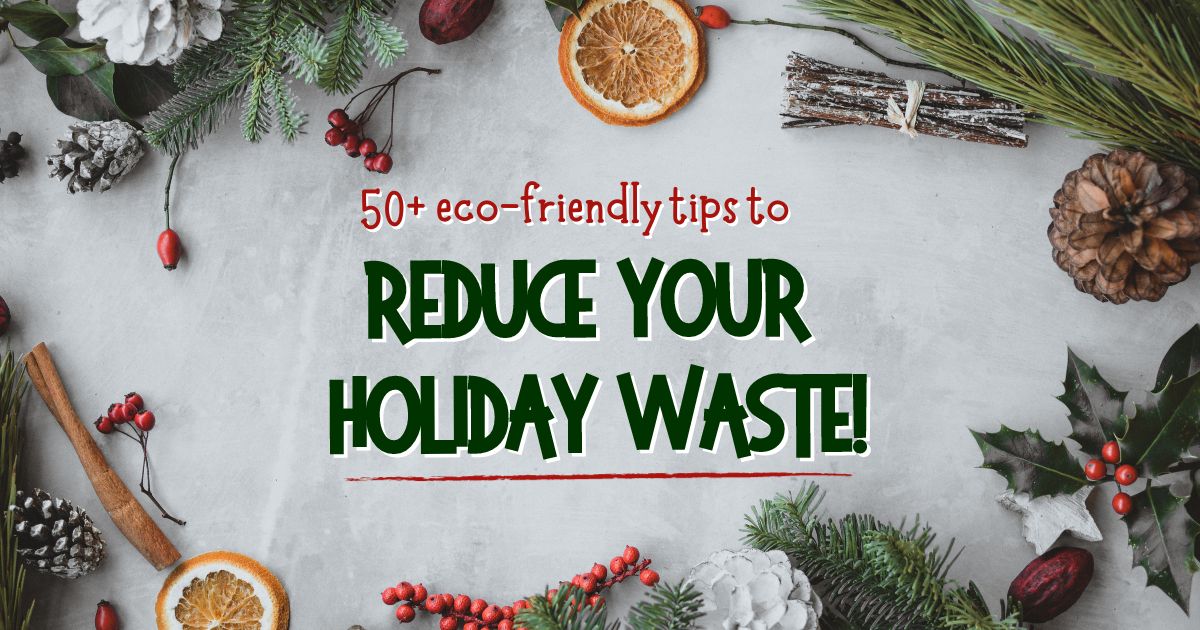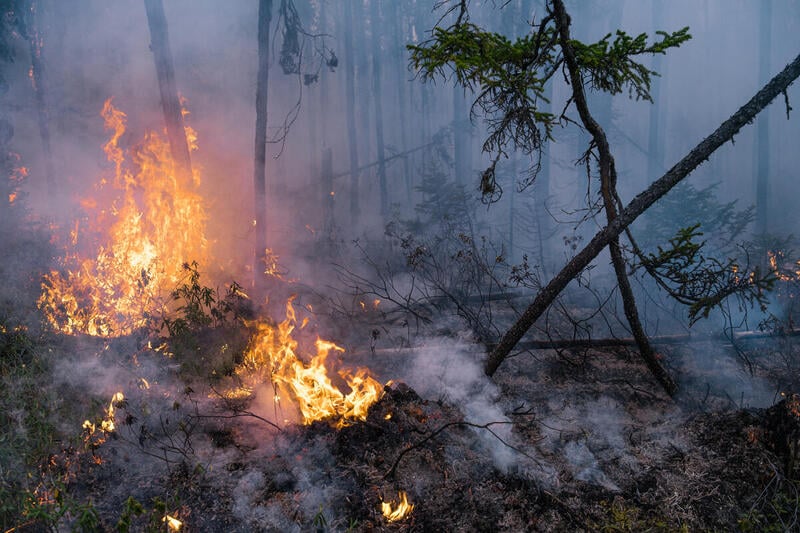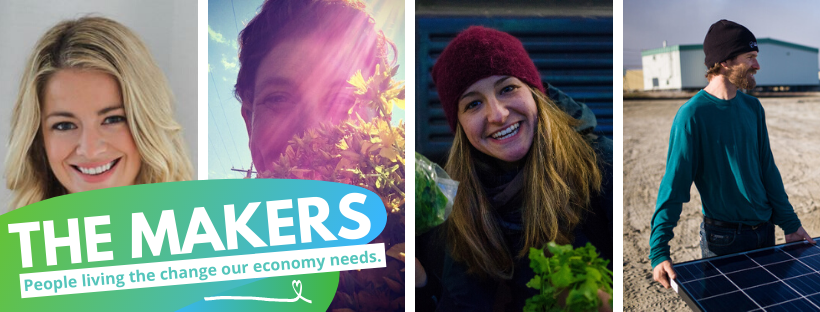
For weeks, we’ve been telling our elected leaders that we don’t want to go back to normal. Instead, we want the economic recovery from COVID-19 to propel us into a better future. With so much of our economy shut down, now is the time to rethink what’s normal and to fix the problems that leave so many people doing without enough food, money, time and happiness, while a select few have much more than their share.
But what does this actually look like?
Big, transformative change can be hard to picture. So we wanted to bring some of the ideas to life by spotlighting extraordinary “regular” people who are living the values that should underpin our government’s plans for economic recovery. Their profiles are below.
When we say we want locally resilient food systems, think about what people like Eva (see below) are doing. When we call for a more equitable clean energy system to replace dirty fossil fuels energy with renewables, we’re talking about how Duncan and the Vancouver Renewable Energy Co-op do things. When we call for an economy that builds strong communities, we think the values described by Tanya (who gets personal protective equipment to health professionals) can be at the foundation. And where we say we need ways of living that value our connection with nature, Amber’s artistry points one way toward what that could look like.
Read on for interview with these inspiring people!
Inspired by what they say? Tell your MP that you want an economic recovery that builds strong communities and a fair, sustainable economy.
Duncan Martin, Vancouver
Solar panel technician, chicken coop wiz, community activist, musician
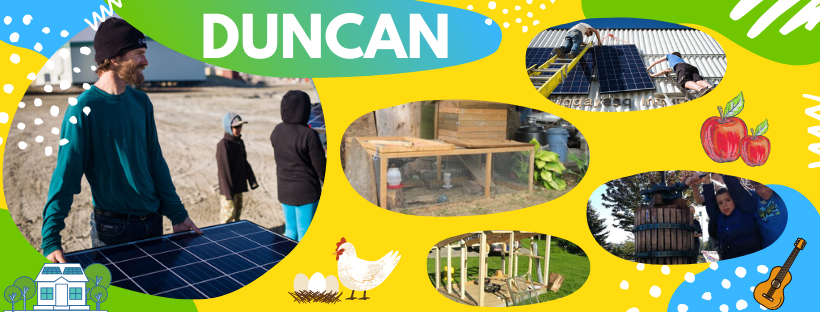
Duncan Martin has a few tricks up his sleeve. He spends his days installing solar panels for the Vancouver Renewable Energy Co-op (VREC), a worker-owned cooperative with a mission to reduce reliance on fossil fuels and wasteful mega-hydro by installing fairly priced renewable energy systems. Duncan even worked with the Inuit community of Clyde River to install solar panels on their Community Hall! He also has a 10-year old business building backyard chicken coops to support local agriculture. Duncan is a musician (a low-carbon hobby), the coordinator of an annual apple press festival and activist for fair housing. “The common thread is conservation and frugality. It’s probably residual World War II and Depression-era values that have been passed down through a few generations,.” he says Follow Duncan on Twitter here.
How is the change you’re leading in your life now connected to system change?
I’ve been with VREC for six years, mainly installing residential photovoltaic arrays on houses and businesses. The co-op model of business is an important distinction from traditional business models. By shifting the power structure away from profit-driven owners and toward worker-generated decision-making, we can focus on values like low-waste, honesty, and quality-of life. In addition to residential solar, we are involved in scalable projects where we can increase solar array size, bring down the cost per watt, and have a shorter payback period. SolShare, a program where multiple investors actually own a solar array, is one way to do it. This allows greater participation in the solar industry by allowing investment by people of various income levels and in various housing situations.
My chicken coop business has been around for 10 years, as long as chickens have been allowed in Vancouver in the modern era [since they changed a bylaw in 2010]. This year, with COVID-19, the orders increased drastically. Half of the callers were people who wanted to be more self-sufficient. And then there were people who I think are looking for hobbies close to home–they had already made bread, bought seeds–all the latest quarantine fads, so chickens came next. My monthly business jumped about ten-fold.
I’m not a purist when it comes to anything really, but when we have a hand in production we inevitably appreciate whatever we consume. The chicken coops and apple presses [for the Press Fest he runs] are all made from recycled material. Part of the joy is in restoring something that was rusting in someone’s yard. In some ways these are quaint hobbies, but they are also just a few examples of the making, repairing, and inventing that we can do with very limited resources. Growth is not the be all and end all. Even in the solar business, it’s welcome news when revenues and profits are up, but it’s not the only marker of success. It should be: did you pay the workers (all 4 of us) a good wage, did you improve your community, and is the business healthy?
What does an economy that takes care of people and our planet look like for you?
I think a fair economy is one that takes all the values that we claim to have and finds a way to make sure that those apply to everyone. I don’t think this is possible on a voluntary basis. We often rely so heavily on a patchwork of private institutions, corporate goodwill, and philanthropy, and many people fall through the cracks if they are not deemed convenient. Having moved to Canada from the States, I value the universal social programs we have here and think we should fight for more. Taxation can be such a maligned word, but it’s really just a formal recognition that financial success comes with a responsibility to make sure that other people get a fair shot and have a healthy planet to live on. An economy that takes care of our planet, in much the same way, must be an all-in effort. It must recognise that the imminent threat of climate change requires massive shifts across industries, and those who are most vulnerable must know that their neighbours have their backs.
The constant growth model is now a collision course. It has become so entrenched that it will take a whole lot of organising and some luck to turn the ship around. I don’t know if the pause of COVID-19 will bring significant change–maybe we will just ramp back up. But people will have this memory which will shift how we view global supply chains, food security, wage inequality, housing justice–everything. It is a collective memory that will be passed down like a ripple. Kind of like how my grandparents passed down their WWII thriftiness to me. There’s an echo from those big events when humans are forced to shift our outlook and test our ability to imagine and create change. Hopefully, we do that soon.
Eva Murith, Montréal
Food waste fighter and co-founder of PRESERVE
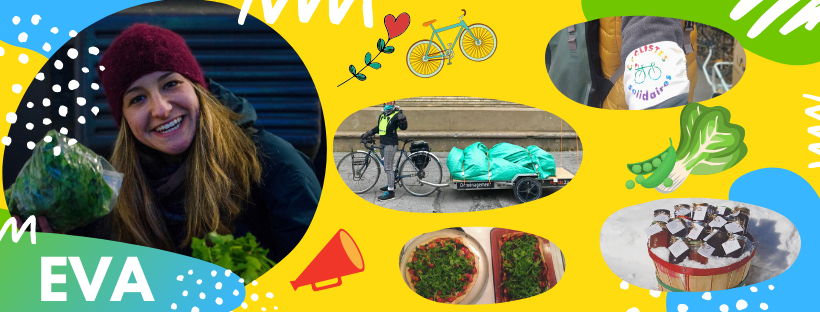
Eva Murith is a “citoyen” and “cultivator of smiles” involved in various local activities. In particular, she is involved in the volunteer citizen movement of Cyclistes Solidaires, which supports community organizations to distribute food to people struggling to access it because of the pandemic. She also supports the search for collective solutions to reduce food waste in institutional and restaurant settings with the non-profit organization PRESERVE.
How is the change you’re leading in your life now connected to system change?
I don’t know if the changes I am making around me will have a systemic impact, but by joining and uniting around movements that address social and environmental issues, I feel that I am supporting their existence. It is for me the best way to take action to build our freedom, our autonomy, and to bring us the energy, laughter and solidarity we need to collectively redraw the contours of the system we wish to make a reality.
What does an economy that takes care of people and our planet look like for you?
For the economy to be fair and for it to allow us to take care of what surrounds us, we need to rethink our whole relationship to the economy itself. The main question should no longer be “what can I do to earn a living?” but “what can I do to improve the situation of those around me?” For this to happen, money should be a means to facilitate our exchanges and not a means of capturing wealth like it is today. In a fair and secure economy, we will be aware of the true value of things, we will be more inclined to share profits, and we will be able to exchange with those who produce in a free and direct way, without any other stakeholders being able to monopolize this wealth.
Amber Friedman, Sunshine Coast of B.C.
Natural dyes textile artist and apothecary shop owner
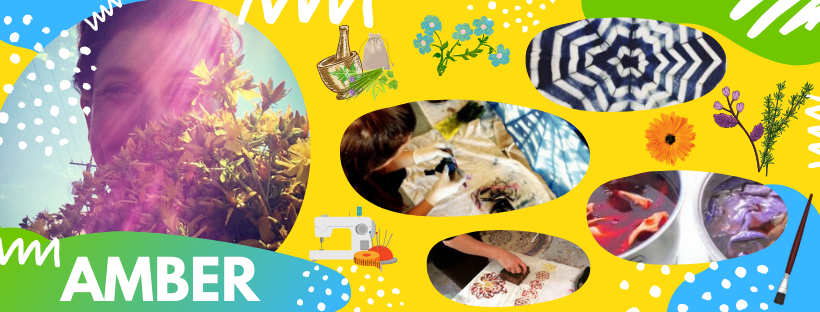
Amber Friedman is an award-winning textile artist, who lives with her family in Powell River, on the B.C.’ coast. Following a lifetime of travel and creativity, beginning with her first camera at five years old. She taught herself how to sew and dye fabric at 10 years old, using up all her mother’s white sheets to do so. Amber is currently exploring using text in her batik paintings, direct application of Indigo and foraging for local medicinal plant colours. Projects on the go include, hand-painted and batik up-cycled clothing and a new line of block printed silk scarves and fabric. She also teaches from her studio in Powell River. Check out her website and work here and follow her on Instagram!
How is the change you’re leading in your life now connected to system change?
Fifteen years ago, I was using synthetic dyes that I mostly bought through the mail. I wanted to be more natural and local and safe. From a young age I knew a textile artist who became allergic to the dyes she worked with after a number of years. That was huge for me. Art is a passion, so the thought of becoming allergic to my passion made me want to find a way out. And when I had my kids, that was the end. I didn’t want to risk the kids getting into things. At the same time, people were asking me about natural dyes. I began studying herbs’ medicinal properties and started my art business focusing only on local plants with healing properties.
I work with up-cycled fabrics and natural and ancient dyes from local plants. St. John’s Wort, for example, can be boiled into a strong tea and used as a dye, painted on fabrics, or for eco-printing (placing leaves and twigs directly onto the fabric to make a design). You can also do this with local barks, flowers from fruit trees, and plants like plantain, yarrow, goldenrod, onionskin, coffee, plum, indigo and more.
I’m a firm believer that we can be supported from the Earth. We’re so used to buying things but under COVID-19 it got more difficult and people started overbuying things, so I felt reassurance that my path was a wise one. I’m really thankful for that. I’ve been teaching workshops on traditional dyes made from local plants, teaching people how to harvest their own plants so they leave the workshop capable of doing it on their own. Workshops help put power back in the hands of the people.
What does an economy that takes care of people and our planet look like for you?
To me this looks like connecting as a community and with nature. It’s also people shopping locally. Customers should ask for what they need so that they can buy it from local people. I’ve also found that having price flexibility built in allows me to support my customers as they support me.
People are so programmed to want to go somewhere or buy something instead of connecting with nature. [With the economic recovery from COVID-19] This is a chance for people to open their minds and change their mindsets. My advice is for people to cut toxic products out of their lives and to give it a chance. I feel like I’ve become a lot more connected to nature in the past 12 years. I find myself admiring nature more in my adult life and seeing how much it benefits me.
Tanya Faire
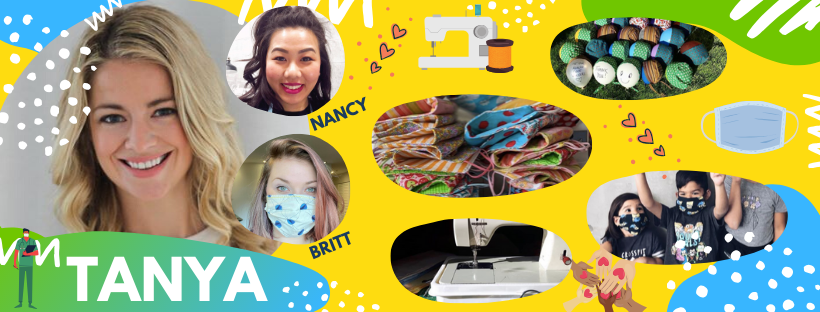
Co-manager of Protect Frontline Workers Vancouver
Through Protect Frontline Workers Vancouver, Tanya (along with Britt Dolleren Wutschnik and Nancy Luong-Lugni) leads a team of 1,400 volunteer member sewers and makers that has provided 10,000 items of personal protective equipment to frontline workers and healthcare professionals during the COVID-19 pandemic — and counting! They’ve been able to provide masks, scrubs, isolation gowns, “ear-saver” headbands to make masks more comfortable, laundry bags for nurses and scrub caps. The group takes their cues from public health guidance and will continue to adapt based on what authorities say. The group uses Can-Ask for a safe, contact-less distribution service. Follow PFWV on Instagram here.
How is the change you’re leading in your life now connected to system change?
I believe that while the government obviously needs to take the lead in responding to a crisis like this, there is also a very important role we as a community have to play. This is not the only challenge we will face in the coming decades. Climate change provides an environmental example and antibiotic resistance represents another health crisis we will likely end up facing. Communities can work with provincial, federal, and municipal government agencies as well as the business community to streamline and execute the delivery of services. For instance, a hospital has provided us materials so that we can sew scrubs for them. Local business owners have donated materials to our cause and many of our volunteer makers are providing well over 60 hours per week of free labour to produce needed items. Systems change ultimately requires this type of collaboration across multiple segments of society, government, and industry.
What does an economy that takes care of people and our planet look like for you?
I think it’s about balancing practicality with respect and empathy for human life. You can’t ignore that we face constraints posed by limited resources. As a society we will need to make compromises in order to protect the environment by reducing our consumption and/or changing our behaviour. That said, we must also protect our economy. Pursuing green energy resources is one example where we can try to strike a balance between both. Staying on the theme of health, I think we could better take care of people by harnessing technology to provide lower cost resources to those who don’t normally have access to the support they need. For example, improving internet infrastructure in remote communities so individuals can access health and mental health resources online.
What’s your vision for the post-pandemic economy? Tell your member of parliament today!
We don’t have long to make sure the post-pandemic recovery helps build a better normal. In a few weeks, our federal government will finalize new plans, policies, and decisions about how to spend billions of our taxpayer dollars to get the economy running again.


